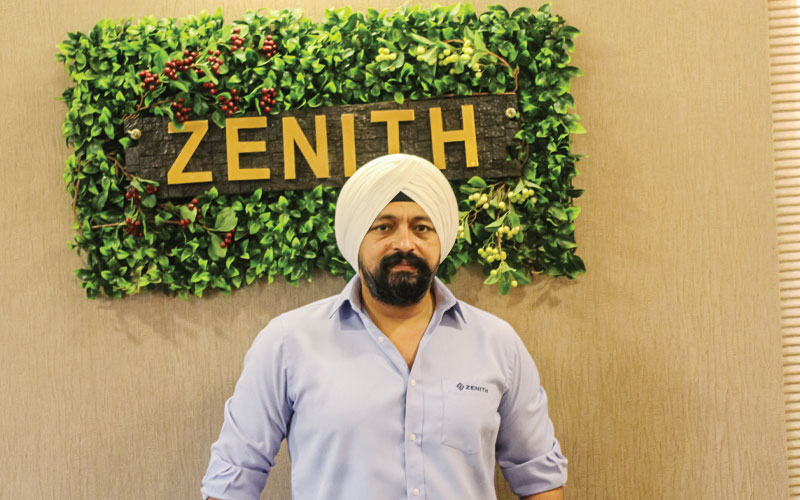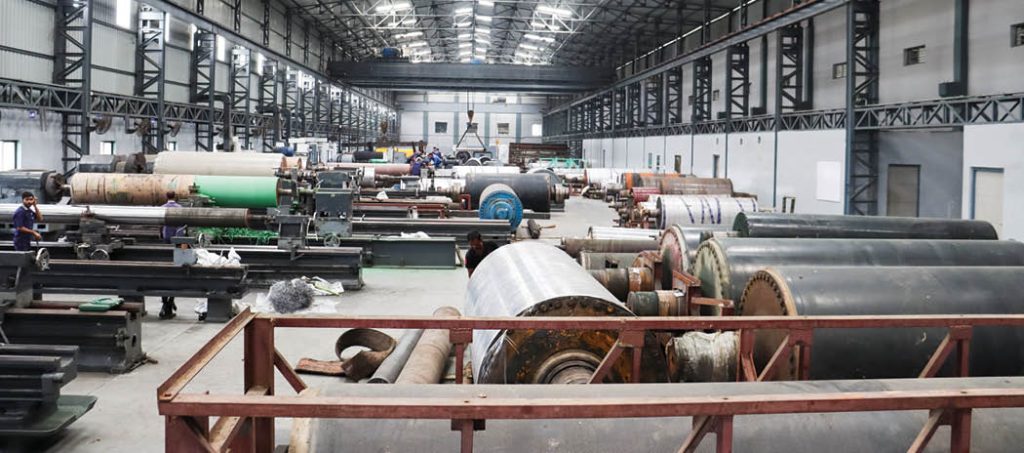Zenith Rubber, one of India’s largest roller manufacturers and distributors, began transforming the industry in the late 1960s. With over five decades of expertise, the company has solidified its presence domestically and then expanded globally with its presence in various countries, including the USA, Brazil, Kenya, and Indonesia. Today, with a 200,000-square-foot facility and 40 associated units, it manufactures 3,000 rollers per day, continuing to make significant strides in the global market. In an exclusive interview with Paper Mart, Mr. PS Paintal, Managing Director, Zenith Rubber Private Limited talks about the journey of the brand and its recent development in the arena of roller manufacturing and distribution.

Paper Mart: Can you share when Zenith Rubber began manufacturing rollers and how the journey has evolved since then? What were some of the key challenges you faced during the early stages of this journey?
PS Paintal: Zenith Rubber began manufacturing rollers some 50 years ago, starting with printing rollers and gradually expanding into industries such as paper, steel, and textiles. We are proud to be the only company in India that manufactures rollers for nearly all industries, offering roller covers in rubber, polyurethane, and composite materials. In fact, we are currently the sole producer of composite rollers, and for the past three years, we were the only ones producing polyurethane rollers until two new companies recently entered the market.
As for the challenges, we’ve certainly faced our share. One of the main hurdles has been the constant need to upgrade, especially with the advent of newer, faster machines and innovation for more advanced compounds. However, we’ve successfully overcome these challenges by investing in better equipment, manpower, and technological innovation to stay ahead of the curve.
PM: What types of paper grade and pulp types can your machine process?
PSP: At Zenith Rubber, we manufacture a wide range of rollers for the paper, steel, and packaging industries. We can produce rollers up to 8 meters in length, 2 meters in diameter, and up to 40 tons in weight. We manufacture rollers in rubber, composite, and polyurethane covering, catering to various industrial needs with a focus on durability and performance.
Watch: In Pursuit of Lesser Water Footprint
PM: What are the key features of your machinery, and how is it unique to similar products available in the market?
PSP: When it comes to rubber coverings, we have upgraded ourselves by associating ourselves with those companies who have pioneered its production. We have bought formulations from them. In polyurethane, we utilize European technology, comparable to what is used by major supplying companies like Voith, Valmet, and SchäferRolls. All the raw materials are imported from outside India, mainly from Europe, Australia and the US. In terms of raw material, we use high-quality raw material to provide high-end products.
In composite rollers, which we launched two years ago, both the raw materials and machinery are sourced from Europe. So, all in all, we stand out in terms of our manpower, advanced machinery, and high-quality raw materials.
PM: What is the lead time of production and delivery and do you offer customization of options?
PSP: Typically, manufacturing new rollers takes around 6-8 months because we also produce the core. But when it comes to recoating—whether it’s rubber, polyurethane, or composite—it generally takes about three to four weeks. This timeline can vary depending on the availability of the assembly line. If the line is free, we can expedite the delivery, but the standard delivery time from the date of order confirmation is usually four to five weeks.

We’re currently experimenting with shoe press belt technology and are preparing to bring this innovation to the market. Additionally, we’re planning to venture into laser engraving, with a team already set up for this. So, down the line, we have few surprises and we hope to succeed in all of them.
PM: You recently launched an epoxy resin composite cover as part of your polyurethane product line. How has this product been performing in the market so far?
PSP: We’ve supplied more than 1,000 polyurethane epoxy resin composite rollers, and the response has been overwhelmingly positive. We launched this product three years ago, and since then, even our competitors have recognized the potential of this market. They are buying these machines, even though they’re not European. There are Chinese machines as well because they too recognize the importance of polyurethane. So, by bringing this product to the market, we have become game changers in the roller industry.
Introducing polyurethane was a bold move, especially since it was priced three to four times higher than traditional rubber rollers. Convincing customers about this new product was a challenge initially, but we’ve succeeded, and the demand continues to grow. Today we sell over 1,000 units in India alone and we’re still counting.

PM: Do you currently have an export market for your rollers?
PSP: We have successfully exported our rollers to the African, Russian, and Middle Eastern markets. However, we started late because we wanted to establish a strong foothold in the domestic market first. In international trade, references are crucial; clients often prioritize the performance history of products over marketing claims. About a year ago, we started our export operations, and so far, we’ve supplied around 30-35 rollers, which are performing well.
PM: What is the domestic and international share of your entire product range?
PSP: Currently, over 80% of our production caters to the domestic market. We’re so focused on meeting domestic demand that we haven’t been able to fulfill all export requests. Moreover, the export market is highly competitive, and we simply don’t have the time to dedicate to it right now. In fact, as part of our growth strategy, one of our goals is that in the next five years, we plan to expand our facilities, potentially adding two or three more factories in India to better meet our demands.
PM: What upcoming projects and expansion initiatives you plan to pursue in your company?
PSP: In terms of expansion and new projects, we manufacture roll grinders, which we have supplied to various industries, including steel and paper. Currently, we produce an average of six to seven roll grinders each year. Recently, we’ve started marketing these grinders in overseas markets, particularly in the Middle East, and on the domestic front, we’ve received three orders from Jindal.
We are also planning to establish another plant dedicated exclusively to manufacturing roll grinders by next year. Although we’ve been producing roll grinders for seven to eight years, we hadn’t highlighted this segment until recently. It’s only in the last year that we began actively marketing them, and this focus is proving to be a valuable addition to Zenith Rubber.
Also Read: Stark Engineering: A Name Synonymous with Green Advanced Technologies
PM: Many mill owners turn to international machinery manufacturers for parts and machinery. So, what are the gaps between us and international machinery manufacturers, and where do we fall short?
PSP: In terms of technology, we are currently about six to seven years behind American and European manufacturers. However, this gap is compensated by our pricing. For instance, a roll grinder from a European company is priced significantly higher than one manufactured by us.
Our domestic can meet approximately 60-70% of the operational requirements necessary for the machine as compared to foreign machinery, allowing the operator to achieve their desired outcomes.
What I mean is that while a machine may come with 100 features, the operator will only need about 10 of them. By customizing the machine to focus on those essential features, we provide better value for money. It’s similar to purchasing a high-end phone with numerous features, only to use about 40 of them. In that case, you might prefer a more affordable option without the extra features. This is where our edge in customization lies.
Additionally, labour and raw materials are comparatively cheaper here, further enhancing our cost advantage. These factors together represent our key strengths in the market.
To conclude, while we may lag behind international manufacturers in technology, we effectively bridge that gap through competitive pricing and tailored solutions. Our focus on customization allows us to meet the specific needs of our clients, ensuring they receive maximum value for the product.
PM: Can you shed some light on your future plans?
PSP: Looking ahead, in the next five years, we see ourselves as a company with extensive expertise in technology, machinery, and manpower. We’ve consistently worked hard to adopt new technologies, keeping pace with the upgraded machines entering the Indian market. Our goal is to become one of the largest producers of rollers in rubber, polyurethane, and composite materials.
We’re also branching out into new areas. We’re currently experimenting with shoe press belt technology and are preparing to bring this innovation to the market. Additionally, we’re planning to venture into laser engraving, with a team already set up for this. So, down the line, we have few surprises and we hope to succeed in all of them.



